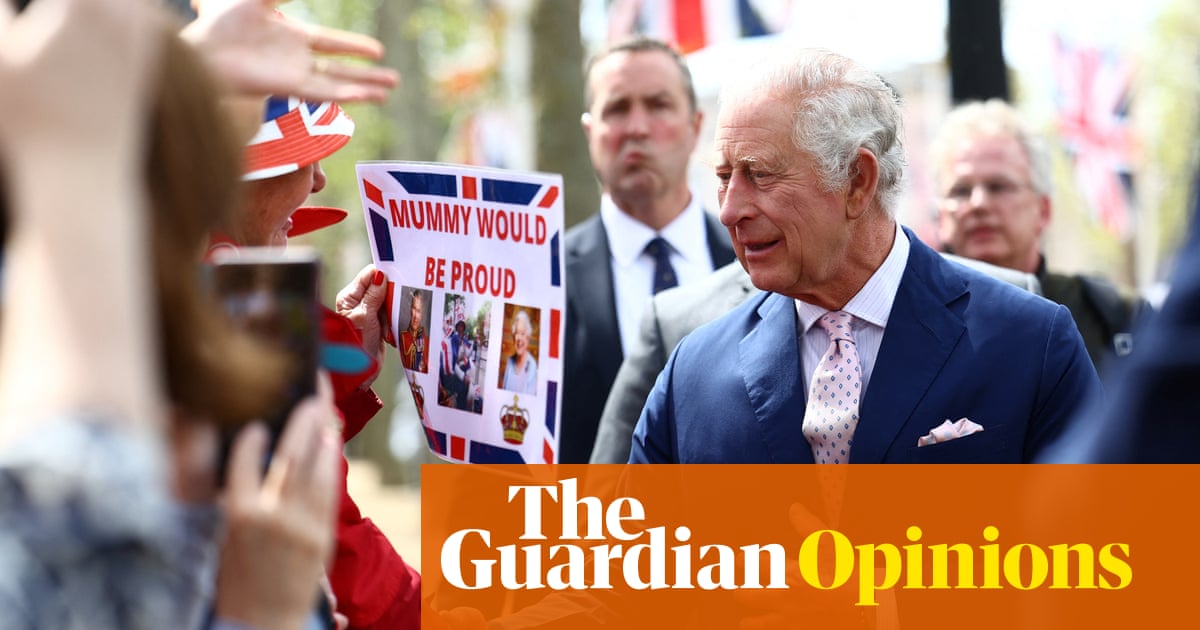
Crowds will line the streets to take part in the coronation. But many present will later struggle to explain exactly why they were there. Witnessing a historic event might be the best answer. Though the spectacle may appeal to viewers, it is the monarchy that depends on it. It is not the people who need the king, but the king who needs the people: the power of performance lies in the response of the audience. The coronation of Charles III is theatre held to convey divine approval to the person of the monarch. It is a cruel irony that while the public are told to get used to being poorer, they are also the crucial props to the lavish excesses of royal pomp and circumstance.
Charles is a very different character from his mother. But the image projected of the monarch owes more to show and glamour than individual nature. That is why the paying public is expected to offer adulation, lest we disrupt the display with disturbing questions about the monarchy’s value and relevance. Such a thought ought to offend any modern sense Britain has of itself. The scandals of recent years have revealed the Windsors to be rather more dysfunctional than the average British household.
With daylight pouring in, it is hardly surprising that royal magic is not quite what it once was. Royalty is uncomfortable in the gaze of a questioning age, one suspicious of stultifying tradition, unearned riches and hereditary privilege. That may explain why Britons protesting against its existence, largely peacefully, have been treated so roughly by the state. The heavy‑handed policing of dissent will do more harm to the royals than good.
Royalty has built support through good works in the community. Its associations with the military provide another buttress. But the desire for greatness undergirded by violence has vanished from Britain. No one ought to regret its departure. Its disappearance means that the king’s armed forces flypast will be at least 10 times smaller than the one that flew over Buckingham Palace for Queen Elizabeth II’s coronation. Other changes will be less visible but no less pertinent. A multicultural society will judge Charles III on how he deals with the roles Charles I and Charles II played in the slave trade. While the class differences laid out from Disraeli’s Two Nations to Orwell’s Wigan Pier persist, new and confounding social divisions have emerged. The future of the United Kingdom itself is an open question.
A “non-political” head of state has its attractions in an era of polarised politics, especially in a democracy lacking meaningful checks on, and proper accountability of, the government. Yet the monarchy is not a disinterested party in the corridors of power. As monarch, Charles cannot refuse assent to a bill just because he doesn’t approve of it. But as Prince of Wales he lobbied ministers for pet causes such as alternative herbal medicines. And as king he can secretly get a law changed, in his personal interest or when it affects powers vested in him, before it comes before MPs.
Seen in this light, the royal family looks to many less like a constitutional safeguard than a self‑serving, wealthy clan. They need the pageantry of grand events, yet their survival rests on resisting the temptation of extravagance. The magic of coronation might have once dazzled and distracted the public. But that country has gone. Whatever the crowds are cheering on Saturday, few want its return.
"crowd" - Google News
May 06, 2023 at 12:25AM
https://ift.tt/6N0TkDi
The Guardian view on the coronation crowds: the public are crucial for royalty - The Guardian
"crowd" - Google News
https://ift.tt/yQBjEgZ
https://ift.tt/rVOnT8J
Bagikan Berita Ini














0 Response to "The Guardian view on the coronation crowds: the public are crucial for royalty - The Guardian"
Post a Comment